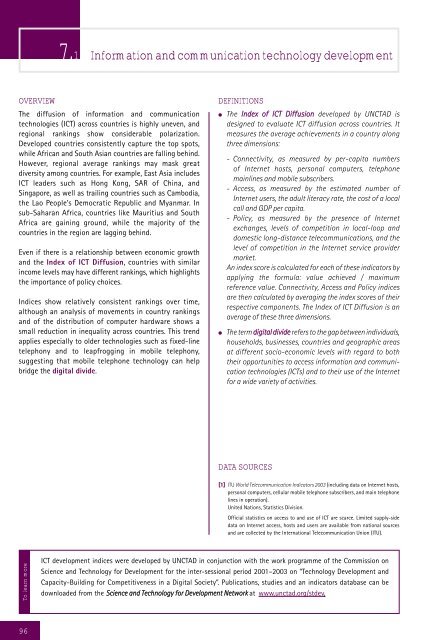Development and Globalization: - Unctad
Development and Globalization: - Unctad
Development and Globalization: - Unctad
Create successful ePaper yourself
Turn your PDF publications into a flip-book with our unique Google optimized e-Paper software.
OVERVIEW DEFINITIONS<br />
The diffusion of information <strong>and</strong> communication<br />
technologies (ICT) across countries is highly uneven, <strong>and</strong><br />
regional rankings show considerable polarization.<br />
Developed countries consistently capture the top spots,<br />
while African <strong>and</strong> South Asian countries are falling behind.<br />
However, regional average rankings may mask great<br />
diversity among countries. For example, East Asia includes<br />
ICT leaders such as Hong Kong, SAR of China, <strong>and</strong><br />
Singapore, as well as trailing countries such as Cambodia,<br />
the Lao People’s Democratic Republic <strong>and</strong> Myanmar. In<br />
sub-Saharan Africa, countries like Mauritius <strong>and</strong> South<br />
Africa are gaining ground, while the majority of the<br />
countries in the region are lagging behind.<br />
Even if there is a relationship between economic growth<br />
<strong>and</strong> the Index of ICT Diffusion, countries with similar<br />
income levels may have different rankings, which highlights<br />
the importance of policy choices.<br />
Indices show relatively consistent rankings over time,<br />
although an analysis of movements in country rankings<br />
<strong>and</strong> of the distribution of computer hardware shows a<br />
small reduction in inequality across countries. This trend<br />
applies especially to older technologies such as fixed-line<br />
telephony <strong>and</strong> to leapfrogging in mobile telephony,<br />
suggesting that mobile telephone technology can help<br />
bridge the digital divide.<br />
To learn more<br />
96<br />
7.1 Information <strong>and</strong> communication technology development<br />
● The Index of ICT Diffusion developed by UNCTAD is<br />
designed to evaluate ICT diffusion across countries. It<br />
measures the average achievements in a country along<br />
three dimensions:<br />
- Connectivity, as measured by per-capita numbers<br />
of Internet hosts, personal computers, telephone<br />
mainlines <strong>and</strong> mobile subscribers.<br />
- Access, as measured by the estimated number of<br />
Internet users, the adult literacy rate, the cost of a local<br />
call <strong>and</strong> GDP per capita.<br />
- Policy, as measured by the presence of Internet<br />
exchanges, levels of competition in local-loop <strong>and</strong><br />
domestic long-distance telecommunications, <strong>and</strong> the<br />
level of competition in the Internet service provider<br />
market.<br />
An index score is calculated for each of these indicators by<br />
applying the formula: value achieved / maximum<br />
reference value. Connectivity, Access <strong>and</strong> Policy indices<br />
are then calculated by averaging the index scores of their<br />
respective components. The Index of ICT Diffusion is an<br />
average of these three dimensions.<br />
● The term digital divide refers to the gap between individuals,<br />
households, businesses, countries <strong>and</strong> geographic areas<br />
at different socio-economic levels with regard to both<br />
their opportunities to access information <strong>and</strong> communication<br />
technologies (ICTs) <strong>and</strong> to their use of the Internet<br />
for a wide variety of activities.<br />
DATA SOURCES<br />
[1] ITU World Telecommunication Indicators 2003 (including data on Internet hosts,<br />
personal computers, cellular mobile telephone subscribers, <strong>and</strong> main telephone<br />
lines in operation).<br />
United Nations, Statistics Division.<br />
Official statistics on access to <strong>and</strong> use of ICT are scarce. Limited supply-side<br />
data on Internet access, hosts <strong>and</strong> users are available from national sources<br />
<strong>and</strong> are collected by the International Telecommunication Union (ITU).<br />
ICT development indices were developed by UNCTAD in conjunction with the work programme of the Commission on<br />
Science <strong>and</strong> Technology for <strong>Development</strong> for the inter-sessional period 2001–2003 on “Technology <strong>Development</strong> <strong>and</strong><br />
Capacity-Building for Competitiveness in a Digital Society”. Publications, studies <strong>and</strong> an indicators database can be<br />
downloaded from the Science <strong>and</strong> Technology for <strong>Development</strong> Network at www.unctad.org/stdev.

















